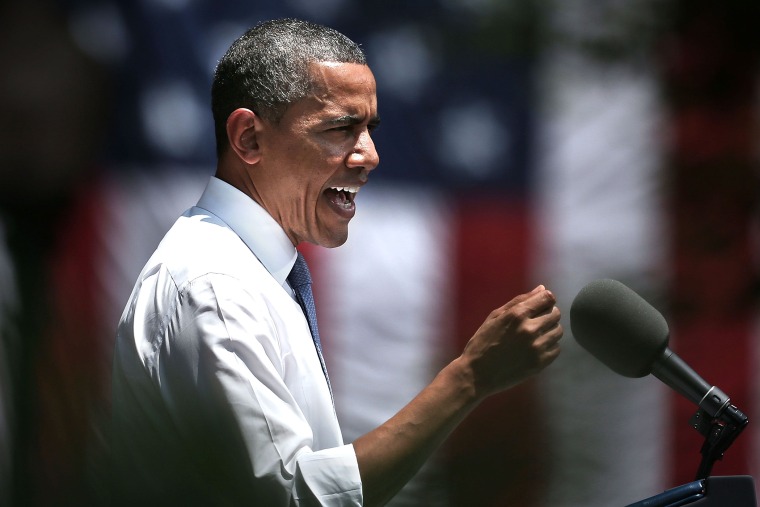President Obama
delivered the commencement address at UC Irvine over the weekend and was rather unrestrained in
his mockery of those "who stubbornly and automatically reject the scientific evidence."
"They say, 'Hey, look, I'm not a scientist.' And I'll translate that for you: what that really means is, 'I know that manmade climate change really is happening but if I admit it, I'll be run out of town by a radical fringe that thinks climate science is a liberal plot,'" the president said.
Forget the president's usual, conciliatory tone -- this was Obama laying down a marker. His remarks were not those of a leader hoping to find some way to work with climate deniers in Congress; this was a speech effectively declaring that we no longer have time for nonsense.
The question is what those climate deniers intend to do about it. Ned Resnikoff
reported yesterday:
Congressional Republicans may not be able to kill a proposed Environmental Protection Agency (EPA) regulation, but they can starve the agency of the funding needed to enforce it. That's how two Congressional Republicans say they now intend to stop a proposed cap on power plant emissions from ever reaching fruition. "We're going to take a serious look at it," said Rep. Ken Calvert, R-Calif., last week. Rep. Mike Simpson, R-Idaho, has also indicated that a bill outlining appropriations for the EPA might include language making it difficult to enforce the proposed regulation.
Calvert isn't alone. Sahil Kapur
reported yesterday that Rep. Mike Simpson (R-Idaho), who chairs the Appropriations subcommittee on interior, also appears to be on board with "using a must-pass government funding bill to block President Barack Obama's new rule to limit greenhouse gas pollution from coal-fired power plants."
But if it's a "must-pass government funding bill," what happens if Republicans use it as a vehicle in support of carbon pollution? As absurd as this may sound, it raises the prospect of an election-year government shutdown.
Even before the Environmental Protection Agency released a big set of proposed coal regulations this month, Republicans had made clear their intent to undermine the rules. Now, senior members of the House GOP are hinting that their preferred strategy for doing this might be using appropriations bills necessary to keep the government open in order to block its implementation. A standoff with Senate Democrats and the president over funding for the EPA and Interior Department could set the stage for a budget showdown, risking a partial government shutdown. Here we go again.
When President Obama unveiled his climate plan, the policy was not dependent on congressional approval -- the White House had the legal authority to act by using powers under the Clean Air Act, so that's precisely what the administration did.
Anti-climate lawmakers can't undo the Clean Air Act, at least not with a Democratic Senate and Democratic White House, so Republicans are trying to block the policy through the spending bill that funds the EPA. No spending bill means the lights go out at the affected government agencies.
For Republicans, that may not seem so awful -- forcing the EPA to close its doors might even sound appealing to some of the more pro-pollution lawmakers -- but this is the same spending bill that funds national parks and monuments.
The question would then become, how big a risk is the GOP prepared to take? Are Republicans so opposed to addressing global warming that they'll impose a partial government shutdown in an election year?
The funding bill has to pass by the end of September. Far-right lawmakers have until then to make their decision.
